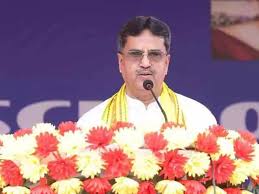The Tripura Legislative Assembly continued its Budget session without the presence of CPIM, which boycotted proceedings over the Speaker’s alleged bias. The ruling BJP and opposition Congress engaged in debates on crucial policies while the absence of the principal opposition party created a noticeable gap in the discussions. The Speaker remained firm on his stance, refusing to entertain CPIM’s demands that led to the boycott.
During the session, the government highlighted its commitment to improving infrastructure, healthcare, and education. The Chief Minister emphasized the importance of strategic planning in urban and rural development, ensuring funds were allocated efficiently. The Finance Minister presented detailed allocations, stressing transparency in expenditure. The opposition raised concerns over budgetary allocations, questioning the feasibility of certain projects and demanding greater accountability from the ruling party.
Legislators actively debated economic policies, with BJP members defending their strategies as necessary for long-term growth. The opposition accused the government of favoring urban areas while neglecting rural development. Congress leaders pointed out discrepancies in the allocation of funds for welfare schemes, pressing for increased financial support for marginalized communities.
Education remained a key topic, with discussions on the recruitment of teachers and the modernization of school infrastructure. The ruling party reassured the Assembly that investments in digital learning and vocational training would benefit students across Tripura. The opposition expressed doubts over the execution of these plans, citing delays in previous government projects.
Healthcare policies were also under scrutiny. The state government reiterated its commitment to strengthening the public healthcare system, with plans to upgrade district hospitals and primary health centers. Congress leaders argued that the current health budget did not adequately address the needs of remote areas, where medical facilities remain scarce.
The absence of CPIM altered the dynamics of the session. While BJP members defended their governance record without significant resistance, opposition voices lacked the strength CPIM’s presence usually brought. Congress leaders attempted to fill the void, but the ruling party largely controlled the narrative.
Despite the boycott, legislative proceedings continued smoothly. Government officials assured citizens that the administration remained focused on addressing public concerns. Policy discussions concluded with assurances that funds would be utilized effectively to enhance the quality of life in Tripura.
With CPIM’s absence raising political tensions, questions remain on whether the party will rejoin discussions in the coming days. The Speaker maintained that he acted within his jurisdiction, dismissing claims of bias. The ruling BJP urged CPIM to return, emphasizing that an active opposition plays a vital role in democracy.
The Budget session will continue, with key financial and policy decisions expected in the coming days. The political landscape remains uncertain, but the state government remains determined to push forward with its agenda, with or without CPIM’s participation.




